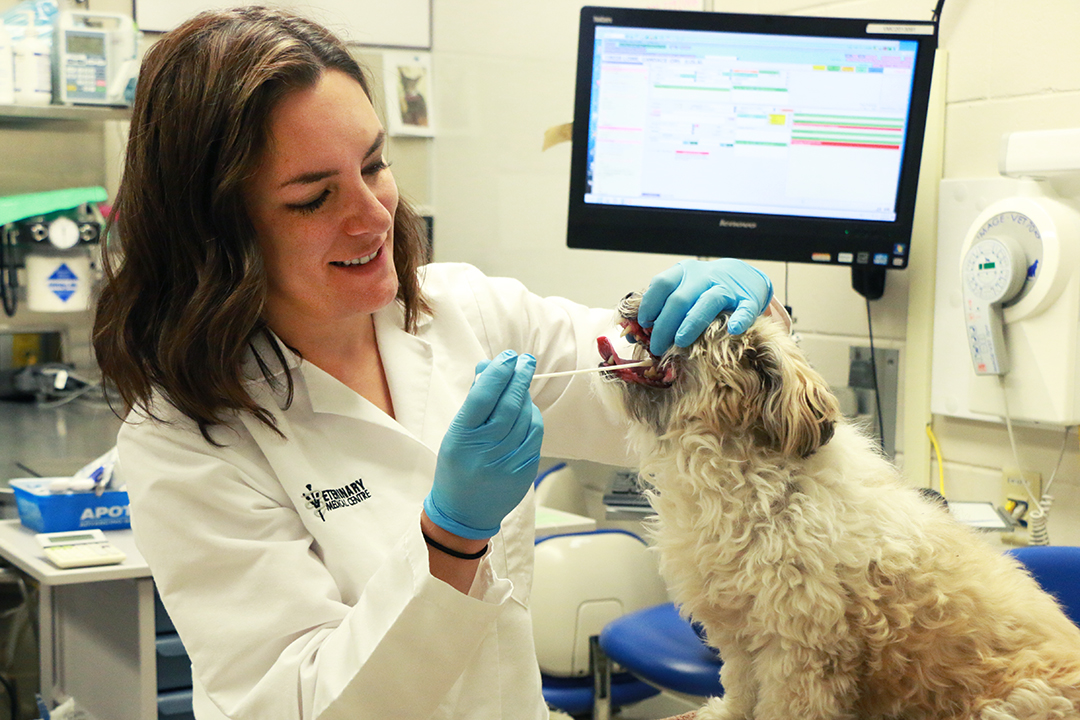
One very determined dentist
Dr. Candace Lowe, a member of the Norway House Cree Nation in Manitoba, is a role model on many fronts: she’s female, Indigenous and an example of what’s possible when a person finds her passion.
By Kathy FitzpatrickThat’s veterinary dentistry in Lowe’s case. But these days, she’s equally passionate in passing on an important message to young people: you can do it, too.
“People always say, ‘Oh, you must be so smart.’ No, I’m not — I was just very determined,” Lowe says.
Lowe is now an assistant professor in the Department of Small Animal Clinical Sciences at the Western College of Veterinary Medicine (WCVM), and she runs the veterinary dentistry clinical service at the college’s Veterinary Medical Centre.
Her path from disengaged high school student in the northern Manitoba mining town of Thompson was far from a straight line. She failed basic math in Grade 12, only because she had not been motivated to do the work and had to repeat the course. Her guidance counsellor also told her she was not university material.
Despite having always wanted to be a veterinarian, Lowe spent her first two years after high school working as a dental assistant, but she wasn’t satisfied. She then got serious about her studies and was accepted at the WCVM. After graduating in 2005, she initially thought of becoming a general practitioner in Victoria, B.C., where both her parents and her in-laws were living at the time. Instead, she took an opportunity to work in radiation oncology before pursuing a residency at the WCVM.
The turning point came with the arrival of veterinary dentist Dr. James Anthony, who launched a combined residency in veterinary dentistry and Master of Veterinary Science degree program at the WCVM. Lowe was the first applicant accepted.
“Without that [program], I would not be here on faculty at the vet college,” Lowe says.
Now a board-certified specialist with the American Veterinary Dental College, Lowe is beginning the tenure process at the WCVM. Her days are filled with teaching, research and clinical work. It can be a tough juggling act. In a week when she was supposed to be off clinical services, she was called in to treat two dogs with broken jaws.
“I can’t say no to those cases, so my research definitely waits for me to go down [to the clinic] and fix those guys,” she says.
Teaching plays a large part in her research. In one project, Lowe is measuring the impact of different instruction methods when it comes to teaching students how to extract a tooth.
Lowe explains she wanted to do this project because the WCVM has the most lecture and lab time focused on veterinary dentistry in comparison to any other veterinary college in North America. She wants other colleges to “see what we’re doing and hopefully increase their dental education for their students.”
She notes that dentistry has become an important part of private veterinary practice and a skill that owners demand. Her former students who have gone on to graduate and practise in Manitoba and elsewhere still email, call and text her to seek advice on difficult dental cases.
Lowe is also working on a research project involving students from the University of Saskatchewan’s College of Dentistry. The researchers are swabbing saliva from dogs that are fed raw food diets, looking for zoonotic bacteria that could potentially spread to owners and their homes.
In 2009, Lowe’s accomplishments were recognized with a National Aboriginal Achievement Award (now called the Indspire Awards) at a ceremony in Winnipeg, Man. She keeps up her northern and Manitoba connections by giving talks to students in Norway House, Winnipeg and Swan River, and by participating in community service clinics in Stanley Mission and La Ronge, Sask.
“I love the appointments where kids come in with their parents. I let them use my stethoscope and explain what they hear, and try to get them excited about veterinary medicine and their pets,” she says.
As for how she carries out being a role model from day to day, Lowe thinks that’s part of the reason why she’s still here at the WCVM.
“[It’s] really just getting to teach these students as they come through. Without me being here they really wouldn’t have any dentistry-focused education.”
